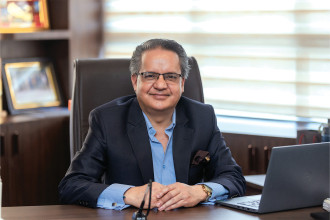-1717654478.jpg)
Ganesh Karki, President of Independent Power Producers’ Association, Nepal (IPPAN), has been actively involved in the hydropower sector for over 20 years. Karki holds a professional doctorate certificate from the European International University. Currently, he is also the Honorary Consul of the Republic of Mauritius to Nepal. He is also the Chartered President of the Rotary Club of Patan Heritage, President of National Gojuryu Karate Association of Nepal and Advisor of Nepal Karate Federation.
Karki has been leading several hydropower projects that are under construction as the Managing Director. These include the Sabha Khola B & C Hydropower Project (32MW), Hewa Khola Hydropower Project (10MW), and Super Khudi Hydropower Project (26.5MW). He is also the Executive Director of Landruk Modi Hydropower Project (86.59MW), Nar Khola Hydropower Project (62MW) and Balephi Khola Hydropower Project (40MW).
Prior to this he, was the Managing Director of Siuri Khola Hydropower project, Singati Hydro Energy and Director of Union Hydropower, Green Life Energy and People’s Hydropower.
Karki has been recognised for his work through various awards including the Jana Sewa Shree by the President of Nepal.
In this edition of Business 360, he delves into the various aspects of leadership. Excerpts:
How do you define leadership?
Leadership for me is being able to drive with vision. A leader can drive an organisation in any way but with proper vision, one can achieve new horizons of success. IPPAN has been actively running since the past 20 years and as its president, I have a vision to ensure that the objectives of IPPAN are disseminated to and heard by all. We are trying to coordinate with ordinary citizens, political leaders and every associated organisation in order to bring things on track and drive with vision. We try to maintain relationships with every associated national and international organisation so that our vision receives international exposure as well.
What are some qualities necessary in a leader?
Honesty is the best policy. A leader needs to be honest. Many leaders speak with a forked tongue to gain applause and compliments. But a true leader is the one who is determined to work and be a person of action. Secondly, it is also important to listen. At times a leader makes a decision but remains unaware of other’s thoughts and opinions. So, first they need to listen to what people have to say and then make decisions accordingly. As a leader one needs to walk together with everyone. Lastly, a leader needs to have knowledge and insight on the subject matter. Proper knowledge will help them to make proper decisions.
What are some agendas that you are addressing as the IPPAN President?
Nepal has so much potential in the hydropower sector. It is a sector in which Nepal can flourish. When a hydropower project starts, other infrastructure like roads and bridges get developed and consequently villages and markets develop and employment opportunities get generated. Nepal has envisioned to produce 28,500 MW of electricity within the next decade and exporting it to neighbouring countries. However, there are several challenges at the policy level as well as in collaboration.
During my tenure, I am trying to impart the message that the private sector is investment friendly in hydropower. My agenda is to effectively collaborate with political party leaders, investors and other private sector players. Internationally as well we are trying to impart the message that Nepal is the market to invest in now. My agenda is to make the hydropower sector more investment friendly.
Is leadership in-born or acquired?
A leader needs to have certain qualities that may not always be in-born. It is about the experiences that a person collects. When a person takes up several leadership goals, they learn and gain experience and eventually they acquire the leadership qualities. It is not easy to be a leader. A leader needs to take several people together, deal with different ideologies, and face failures at times. So, with time one gains the knowledge and experience and acquires leadership skills.
What is your leadership mantra?
Walking together with everyone. There are people who like me and those who do not like me. But I believe in working with them, listening to all voices in my goal to take this sector ahead.
How can one effectively lead a team?
First and foremost, it is important to understand that whatever good or bad might happen, the team owns it. As a leader I might know and do several things but it is essential to have team discussions and listen to what the team has to say. It should not be about ‘me’ but ‘us’. When the leader listens to the team and moves forward, then they will have the support of the team. This is exactly what I do to effectively lead my team. A leader’s backbone is their team.
When should a leader pass on the baton?
Talking about IPPAN, before me there were various leaders who successfully ran IPPAN in their own way. And now when I am the President, it does not indicate that their goals or objectives end with their tenure. I aim to take their ideas and works and add my insights as well. Even now I conduct meetings with our previous leaders and take their opinions and experiences so that I can lead in a more effective manner. And this does not mean that I always have to lead. I believe that I need to train those who are willing to come to the leadership position after me. I ensure that the upcoming leaders are also given opportunities so that they are able to explore their potential.
After my tenure, I will ensure that the upcoming leaders’ tenure will be better than mine. What I mean here is that every leader adds value to an organisation. When a new leader comes, they will carry forward the objectives of the previous leaders, their action plans.
I have also seen in many organisations that leaders work for 3-4 tenures as well. But I do believe that one tenure can be impactful enough if you work well.
How do you view leadership in the past and present generation?
Currently, we can see a lot of youths showing interest in taking up leadership positions and doing something for the country. They are filled with determination and enthusiasm. They also have new education and new technology. At the same time, older leaders have experience. Both aspects are important.




-(1)-1752214965.jpg)
-1744698999.jpg)